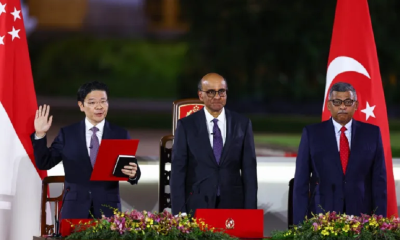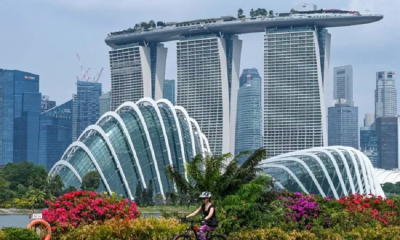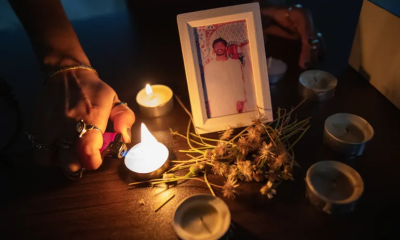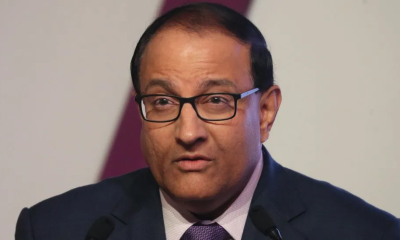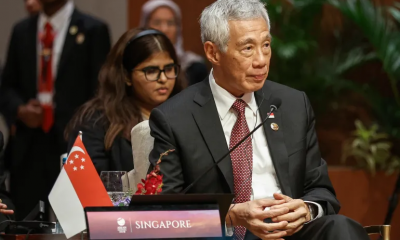Foreign News
Singapore tightens rules for expat workers with an eye on local discontent

Singapore – One of the world’s most open economies is attempting a delicate balancing act.
On the one hand, the Southeast Asian city-state wants to lure the world’s best and brightest to bolster its workforce, one of Asia’s most diverse. On the other hand, it has to assure locals competing with foreigners for jobs that the system works for them, too, nipping potential resentment or xenophobia in the bud.
From next year, the government will tweak that calculus in favour of locals by raising the salary threshold for foreigners seeking approval to work in the city-state.
Last month, Singapore’s Ministry of Manpower announced that new applicants for the Employment Pass (EP) system will have to earn at least 5,600 Singapore dollars ($4,140) per month, up from 5,000 Singapore dollars ($3,700).
Applicants working in the financial services sector will have to earn at least 6,200 Singapore dollars ($4,600), compared with 5,500 Singapore dollars ($4,100) at present.
“By regularly updating the qualifying salaries based on the set wage benchmarks, we ensure a level-playing field for locals,” Manpower Minister Tan See Leng told parliament during a budget debate.
Analysts said the changes were not surprising for a government that has regularly tweaked the rules for expat workers, most recently in September 2022, when it raised the salary threshold by 500 Singapore dollars ($370).
Walter Theseira, an associate professor and labour economist at the Singapore University for Social Sciences (SUSS), said the move had been “telegraphed for a number of years”.
Theseira said that while the EP system was originally intended to import highly-skilled workers to fill gaps in the workforce, “the criteria seemed to have expanded and EP holders became more prevalent in the middle of the market as well”.
“This was perceived by local workers to be unwelcome competition for jobs that many skilled locals could do, so the government responded by re-calibrating the EP again upwards, so that based on salaries, it now targets more clearly the high-end,” he said.
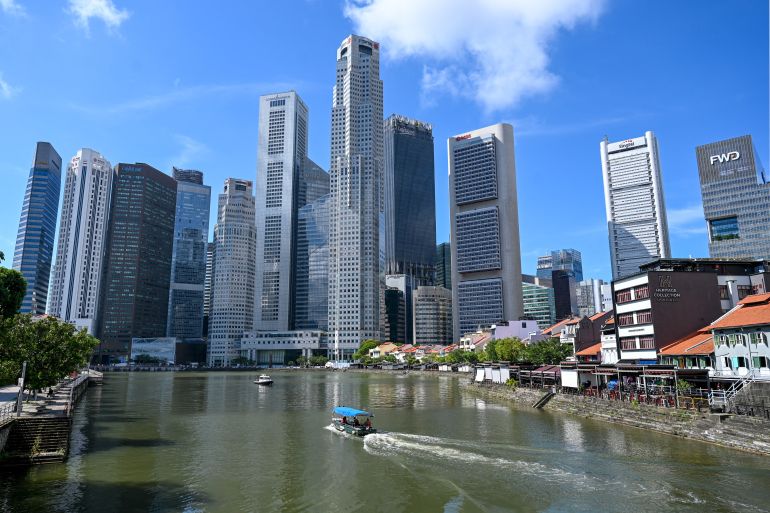
Singapore has built its reputation on attracting foreign talent (Aljazeera)
For decades, Singapore, an island with no natural resources that is about the size of New York City, has built its reputation on an openness to foreign talent.
The number of EP holders has grown substantially over the years, fuelled in part by anxiety over the country’s rock-bottom birthrate and greying population.
As of December last year, there were about 205,400 EP holders in the city, up from 161,700 during the same month in 2021.
As far back as 2021, Tan acknowledged that Singaporeans, though recognising the need to attract foreign talent, had concerns that the influx came at the “expense” of local businesses.
A labour market report released by the Manpower Ministry last month showed that employment growth in 2023, comprising 88,400 positions in Singapore – excluding migrant domestic workers – was largely made up of foreigners.
The revision of the EP qualification criteria can be seen as “a strategic move” to appease age-old tensions over hiring foreign talent amid a crowded job market, said Joshua Yim, the CEO of Achieve Group, a talent acquisition consultancy.
The changes also come as the Southeast Asian country is gearing up for one of the most politically significant transitions in its history.
Singapore’s ruling People’s Action Party is set to fight the next general election, due by 2025, under new leadership as incumbent Prime Minister Lee Hsien Loong prepares to step down after some two decades in office.
The issue of foreign workers became salient in the 2011 general election, when public discontent simmered over rising competition for jobs and increasing pressure on public infrastructure.
While most Singaporeans and permanent residents agree that immigration is generally good for the economy, slightly more than half also believe that immigrants take jobs away from locals, according to a 2021 survey by the Institute of Policy Studies.
In another survey conducted by the research firm Milieu Insight, Singaporeans were almost evenly divided on whether the nation struck the right balance between bringing in foreign workers and protecting local jobs.
Sid Suhas, the senior vice president and head of EMEA & APAC at the talent acquisition firm Cielo, said the visa changes are likely to prompt large employers to “focus more on attracting, developing and nurturing the local talent pool, particularly for junior professional and mid-level lower-skilled roles.”
With the higher salary threshold, companies are likely to adopt “a skills-first approach” when employing foreigners, Suhas said, focusing on talent in areas such as AI, technology, engineering and healthcare.
“The trend of limiting foreign talent deployment to specific skills and industries is inevitable. In the past, foreign talent had the opportunity to develop their careers in Singapore across various roles but now, the focus will likely be on senior and niche positions,” Suhas told Al Jazeera.
Suhas said he has already seen companies exploring alternative locations in the Association of Southeast Asian Nations (ASEAN) such as Thailand, Malaysia and Indonesia, as a means of relocating key talent while still maintaining proximity to Singapore.
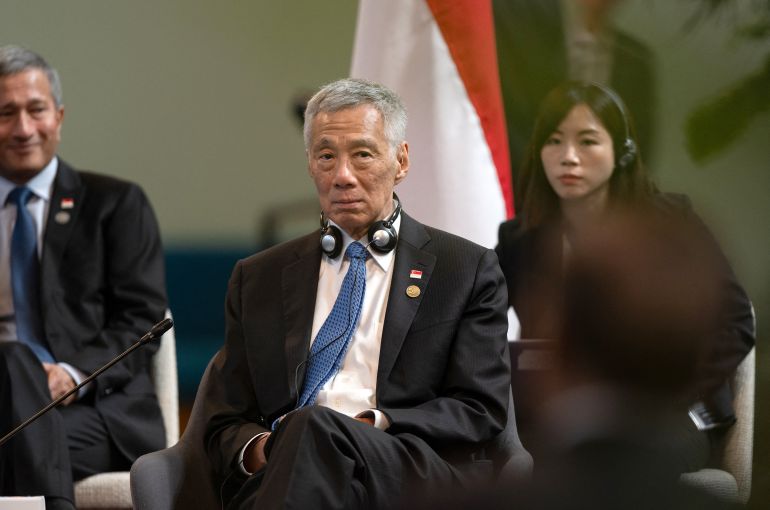
Singapore’s Prime Minister Lee Hsien Loong is due to step down before the 2025 general elections (Aljazeera)
“Most SMEs [small to medium-sized enterprises] do not rely much on EP workforce as their core talent pool,” Yuit told Al Jazeera.
“Selected businesses may have EP hiring in the stated 5,000 or 5,500 [Singapore dollars] range for specialised roles but usually, that is for time-limited, project engagement or if they are in specialised sectors that rely on a foreign talent pool because of a lack of matching local workforce.”
But the increased labour costs could affect the profitability of SMEs with tighter budget constraints, said Achieve Group’s Yim.
“Local SMEs may not be so well-oiled in terms of their processes and operations, as compared to the MNCs,” Yim said.
“They will feel the heat because they have to go up against the big players with the financial muscles who can offer higher EP salaries and attract better-quality talent. They might feel that talent is being stolen away and thus, this group is at the shorter end of the stick.”
Xu Le, a lecturer from the department of strategy and policy at the National University of Singapore’s Business School, said the policy change could “spur local companies to think out of the box and explore alternative methods to enhance overall operational efficiency and labour productivity”, in turn benefitting the economy.
Beatrice Liu-Cheng, the CEO of Oriental Remedies Group, said that while the higher-qualification threshold could pose challenges for her chain of Chinese medicine clinics, it would also be an “opportunity to further enhance the diversity and expertise” within its workforce.
Liu-Cheng said the changes would encourage her to seek out and nurture Singaporean talent through training programmes, mentorship initiatives and partnerships with educational institutions.
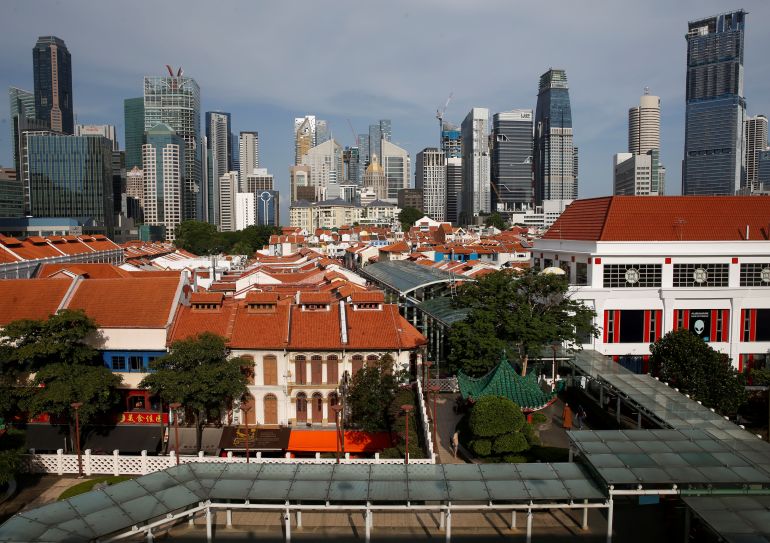 Singapore is known for its business-friendly environment (Aljazeera)
Singapore is known for its business-friendly environment (Aljazeera)
While the migration changes are set to raise the cost of doing business, Singapore’s advantages, including a business-friendly environment, its strategic location and world-class infrastructure, will continue to attract international companies, analysts said.
Singapore is expected to remain “the preferred choice” for firms’ regional headquarters, said Cielo’s Suhas, even if deploying smaller teams becomes more common due to the higher costs.
Suhas said the changes would also accelerate the various government initiatives aimed at creating high-quality jobs for locals, including early talent programmes and re-skilling programmes for mid-to-late career professionals.
“As a result, we anticipate that global companies setting up in Singapore will increasingly prioritise hiring Singaporeans,” he said.
Singapore ranks second in the 2023 World Economic Forum’s Global Talent Competitiveness Index, behind Switzerland.
Nicholas Sim, an associate professor at SUSS’s business school, said that businesses seeking to establish a foothold in Asia are still likely to prioritise Singapore due to its “high-quality infrastructure, efficient and stable government and access to a high-calibre talent pool”.
Besides the EP scheme, there are other avenues for foreign talent to come to Singapore.
In 2023, the Manpower Ministry launched the Overseas Networks & Expertise Pass for “top talent” in business, arts and culture, sports, academia and research.
As of January, the ministry had approved nearly 4,200 applications for the pass.
“Going forward, it’s a clear sign that the Singapore government wants to bring high-calibre individuals into the Singapore workforce – and firms will need to deliberate more carefully about hiring top-tier foreign candidates who are skilled and can add to Singapore’s long-term competitiveness,” Yim said.
”All the more, MNCs will see Singapore as a place for the cream of the crop.”
(Aljazeera)
Foreign News
Iran begins 40-day mourning after Khamenei killed in US-Israeli attack
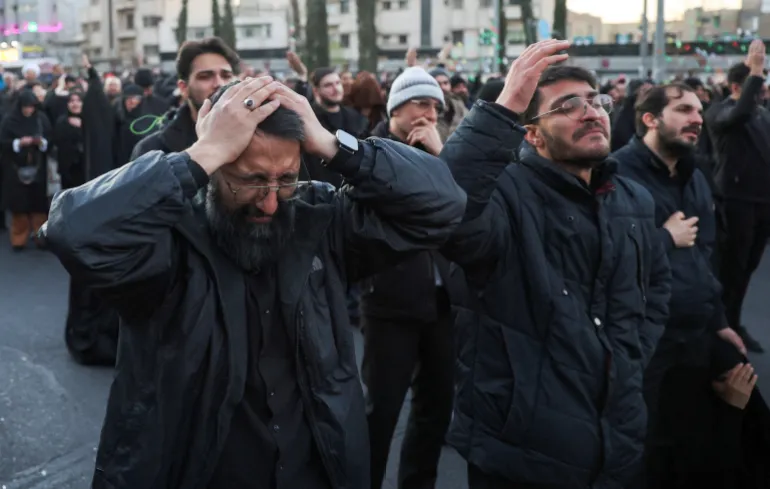
Iran has begun 40 days of mourning after Supreme Leader Ayatollah Ali Khamenei was killed in ongoing attacks by the United States and Israel, according to Iranian state media.
Top security officials were also killed in Saturday’s strikes, along with Khamenei’s daughter, son-in-law and grandson. The killings mark one of the most significant blows to Iran’s leadership since the 1979 Islamic revolution.
President Masoud Pezeshkian condemned the killing as “a great crime”, according to a statement from his office. He also declared seven days of public holidays in addition to the 40-day mourning period.
Reporting from Tehran, Al Jazeera’s Tohid Asadi said people were pouring into the streets of the capital following the news of Khamenei’s killing.
“There will be expected ceremonies,” he said, noting they would likely take place amid continuing bombardment across the country.
Protests denouncing Khamenei’s killing were also reported elsewhere, including Shiraz, Yasuj and Lorestan.
Footage aired by Iranian state media showed supporters mourning at the shrine of Imam Reza in Mashhad, with several people seen crying and collapsing in grief.
The killing also led to protests in neighbouring Iraq, which declared three days of public mourning. In Baghdad, protesters confronted security forces in the heavily fortified Green Zone, which houses Iraqi government buildings and foreign embassies.
Videos verified by Al Jazeera showed demonstrators waving flags and shouting slogans, with witnesses saying some were attempting to mobilise towards the US Embassy. Footage also showed protesters blocking vehicles at a roundabout near one of the entrances to the area.

There was also a protest in the Pakistani city of Karachi, where footage, verified by Al Jazeera, showed people setting fire to and smashing the windows of the US consulate.
However, there have also been reports of celebrations in Iran, with the Reuters news agency quoting witnesses as saying some people had taken to the streets in Tehran, the nearby city of Karaj and the central city of Isfahan.
Meanwhile, the official IRNA news agency reported that a three-person council, consisting of the country’s president, the chief of the judiciary, and one of the jurists of the Guardian Council, will temporarily assume all leadership duties in the country. The body will temporarily oversee the country until a new supreme leader is elected.
Khamenei assumed leadership of Iran in 1989 following the death of Ayatollah Ruhollah Khomeini, who had led the Islamic revolution a decade earlier.
While Khomeini was regarded as the ideological force behind the revolution that ended the Pahlavi monarchy, Khamenei went on to shape Iran’s military and paramilitary apparatus, strengthening both its domestic control and its regional influence.
Meanwhile, the Islamic Revolutionary Guard Corps (IRGC) pledged revenge and said it had launched strikes on 27 bases hosting US troops in the region, as well as Israeli military facilities in Tel Aviv.
[Aljazeera]
Foreign News
Briton among 19 killed in Nepal bus crash
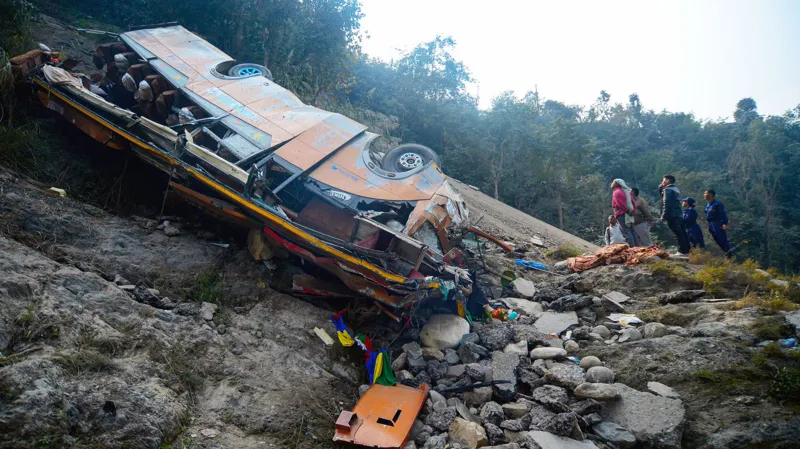
A 24-year-old British man is among 19 people who were killed in a bus crash in Nepal, police say.
The bus – which had been carrying tourists – had been travelling to the capital, Kathmandu, when it lost control and fell 200m on to the bank of the Trishuli river, in the country’s central Dhading district, in the early hours of Monday morning.
There were 44 people onboard including the driver, 25 of whom suffered injuries. The bus had been travelling from Pokhara, a popular tourist spot.
Nepal’s Home Ministry has created a five-member taskforce to investigate the cause of the incident. The UK Foreign Office said it was assisting the family of the Briton who was killed.
Nepalese authorities identified him as Stewart Dominic Ethan. His name has not been confirmed by the Foreign Office.
Nepalese police say they have identified all 19 bodies, including a 40-year-old Chinese woman and a 32-year-old man from India. Among the injured is a Chinese national and a New Zealander.
All the injured had been taken to hospitals in the capital, they added. Children were among those onboard.
Multiple teams were sent to the site, including police units, the army and a rescue team of divers, authorities said.
Police spokesman Abinarayan Kafle said 17 people died at the scene, with two more dying while receiving treatment, BBC Nepali reported.
Road accidents are relatively commonplace in Nepal, due to a range of factors including poor road maintenance and narrow paths in mountainous areas.
In 2024, at least 14 people died after a bus travelling from Pokhara to Kathmandu fell into the Marsyangdi river in the Tanahun district.
“We are supporting the family of a British man who has died in Nepal and are in contact with the local authorities,” a Foreign Office spokesman told the BBC.
Nepal is a popular destination for many international visitors, especially climbers, who travel there to access a key section of the Himalaya mountain range that includes Mount Everest.
Home to eight of the world’s tallest peaks, mountaineering is a significant source of revenue for the country – in 2024 climbing fees brought in $5.9m.
[BBC]
Foreign News
Mexico’s most wanted drug lord ‘El Mencho’ killed in military operation

Mexico’s most wanted man and the leader of the feared Jalisco New Generation (CJNG) drug cartel has been killed during a security operation to arrest him, the defence ministry has said.
Nemesio Oseguera Cervantes, known as “El Mencho”, died on Sunday as he was being taken to the capital Mexico City, after being seriously injured in clashes between his supporters and the army.
Four CJNG members were killed in the town of Tapalpa, the central-western Jalisco state. Three army personnel were also injured. The US had given Mexico with information that assisted the operation.
CJNG retaliated by setting cars alight, building roadblocks and attacking security forces in eight states.
Mexico’s President Claudia Sheinbaum Pardo later urged people to remain “calm”.
In a post on X, she wrote that “in most parts of the country, activities are proceeding normally”.
The CJNG cartel – which had its original power base in Jalisco – is now present across Mexico.
El Mencho, a 59-year-old former police officer, ran a vast criminal organisation responsible for trafficking huge quantities of cocaine, methamphetamine and fentanyl into the US.
It had offered a $15m (£11.1m) reward for information leading to El Mencho’s capture.
In a statement, the Mexican defence ministry said the operation was “planned and executed” by the country’s special forces.
Aircraft from the Mexican Air Force and the National Guard were also deployed.
It also said that several armoured vehicles and weapons – including rocket launchers – were seized during the operation.
The US had been providing information to Mexico that assisted its operation, the statement said.
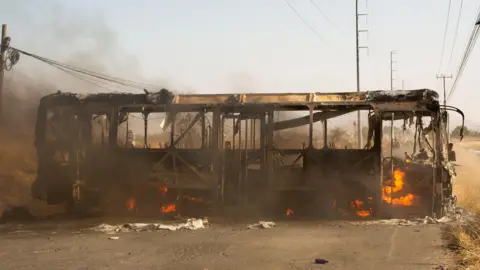
Eyewitnesses have filmed plumes of smoke rising over several cities including Guadalajara – one of the host cities of the forthcoming Fifa World Cup.
In the tourist hotspot of Puerto Vallarta, on the Jalisco coast, potentially thousands of tourists are trapped in the resort around the fighting.
Throughout Sunday, there were reports of gunmen on the streets in Jalisco and elsewhere.
The governor of Jalisco, Pablo Lemus Navarro, on social media advised residents of the state to adhere to a code red warning and avoid leaving their homes.
He also said that public transport was suspended in the state.
The US Department of State issued a shelter-in-place warning for US citizens in the states of Jalisco, Tamaulipas, as well as some areas in Michoacan, Guerrero and Nuevo Leon.
Former US ambassador to Mexico and Deputy Secretary of State Christopher Landau described El Mencho on social media as “one of the bloodiest and most ruthless drug kingpins.”
He added that El Mencho’s death was “a great development for Mexico, the US, Latin America, and the world”.
The killing of El Mencho represents a victory for the Mexican president in her fight against the country’s drug cartels.
It also could strengthen her relationship with US President Trump, who often has demanded more progress on security in Mexico.
However, if the security forces can’t bring the situation under control quickly, the Mexican administration’s victory may be overshadowed by the cartel’s violent response.
The Jalisco cartel has gained notoriety since it was formed in about 2010 for a series of attacks on security forces and public officials.
It has downed an army helicopter with a rocket-propelled grenade, killed dozens of state officials, and has even been known to hang the bodies of its victims from bridges to intimidate its rivals.
[BBC]
-

 Features6 days ago
Features6 days agoLOVEABLE BUT LETHAL: When four-legged stars remind us of a silent killer
-

 Business6 days ago
Business6 days agoBathiya & Santhush make a strategic bet on Colombo
-

 Business6 days ago
Business6 days agoSeeing is believing – the silent scale behind SriLankan’s ground operation
-

 Features6 days ago
Features6 days agoProtection of Occupants Bill: Good, Bad and Ugly
-

 News6 days ago
News6 days agoPrime Minister Attends the 40th Anniversary of the Sri Lanka Nippon Educational and Cultural Centre
-

 News6 days ago
News6 days agoCoal ash surge at N’cholai power plant raises fresh environmental concerns
-

 Business6 days ago
Business6 days agoHuawei unveils Top 10 Smart PV & ESS Trends for 2026
-

 Opinion2 days ago
Opinion2 days agoJamming and re-setting the world: What is the role of Donald Trump?




